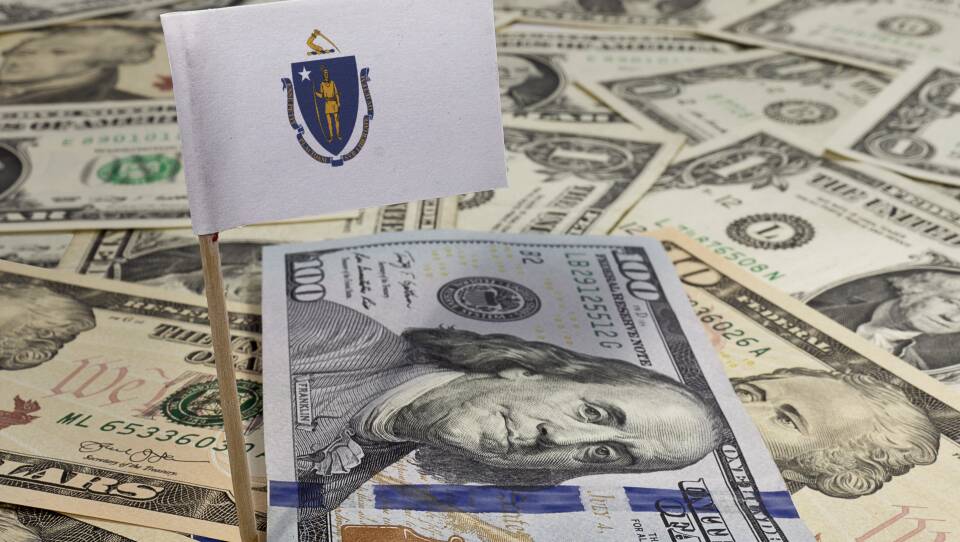Massachusetts Question 1 is a big-money battle over tax policy that asks voters what is the best way to pay for popular investments, and, more philosophically, how much income makes someone wealthy.
Voters will decide in the Nov. 8 election whether Massachusetts should add a new 4% surtax on incomes over $1 million, with the revenue generated by that tax dedicated to education and transportation. The tax would be paid only on the amount of income above the first $1 million, and that threshold would be adjusted annually to reflect any increases in cost of living. It would kick in for the tax year starting Jan. 1, 2023. Question 1 has been commonly referred to as the "Millionaire's Tax," "Fair Share Amendment" and "Tax Hike Amendment."
While the federal government and many other states use a graduated tax, with higher earners paying higher rates, Massachusetts has a flat 5% income tax. The flat tax is written into the state’s constitution, so passing the ballot question would amend the constitution.
Supporters of the question say it would make the state's tax structure and broader economy fairer by asking those who make more money to kick in a larger share to fund common resources like roads and schools. They say billionaires and multimillionaires can afford to pay more, and that writing the measure into the constitution guarantees the money will go where it is intended.
“This is certainly not meant to be a punishment of anyone, but really about how we all invest in our communities," said Liz Speakman, an organizer for the Fair Share Amendment campaign. "And for those who have succeeded and can afford to pay a little bit more, for them to be able to help out with that investment, it's going to just benefit everybody.”
Opponents, meanwhile, are focusing their campaign on the population of "one-time millionaires" who would not earn enough to pay the new tax each year but would cross the income threshold just once after a rare event like selling their small business. They also say the amendment leaves it up to state lawmakers to decide how, specifically, to spend the money within the broad buckets of transportation and public education, including whether they increase the overall funding or shift dollars around.
“Small businesses are hurting,” said Dan Cence, spokesperson for the No on Question 1 campaign. “They’re coming out of COVID, they have supply chain issues, there is inflation, there is a worker shortage. Heaping another, greater tax upon them — it’s just not the right time to do it.”
The Center for State Policy Analysis at Tufts University reported earlier this year that the tax would affect less than 1% of Massachusetts households in any given year, but could raise "a meaningful amount of money" as those households account for more than a fifth of all taxable income in the state. The center projects that the tax would raise, “in a highly progressive way likely to advance racial and economic equity,” about $1.3 billion in 2023. That figure accounts for out-of-state moves by some high earners and steps others would take to shield their income from taxes.
The question’s path to the ballot began seven years ago — before the COVID-19 pandemic shuttered schools and businesses, before state lawmakers passed a school finance reform law that pledged $1.5 billion in new education funding over seven years but did not identify where that money would come from, and before patterns of understaffing and underinvestment at the MBTA caught the eyes of federal regulators.
Proponents originally sought to place the question on the 2018 ballot, but that state’s highest court derailed that push when it ruled the proposal improperly mixed two unrelated topics: the tax policy change and the spending earmarks. Constitutional amendments initiated by lawmakers don’t face the same related-subjects requirement, so backers revived the proposal in 2019 as a legislative amendment, and the House and Senate twice voted overwhelmingly to advance the new version to the 2022 ballot.
Unions have poured money behind the question, and the committees backing it have raised more than $21 million this year. A big slice of that comes from the Massachusetts Teachers Association, which made a $6 million contribution in September, and the National Education Association.
The opposition has raised $9 million. While they're trailing the proponents financially, that's still more than twice what Democratic candidate for governor Maura Healey has collected in 2022. Top donors to the anti-surtax campaign include Boston's Suffolk Construction, New Balance Chairman Jim Davis, and the Connecticut-based Rand-Whitney Containerboard, who have all chipped in at least $1 million.
A July Suffolk University poll found 56% of voters in support of the surtax, with 36% opposed.
Massachusetts voters have rejected different proposals to allow graduated taxes at the ballot five times before, most recently in 1994. None of those measures steered funds toward education or transportation the way this year’s question does.
While the question says this money is only for transportation and education — specifically "for quality public education and affordable public colleges and universities, and for the repair and maintenance of roads, bridges and public transportation" — lawmakers will decide what to spend it on when they craft each year's state budget. If the question passes, the Legislature would likely stick closely to its wording in the initial years, but there's no guarantee how future classes of lawmakers might interpret that commitment.
Voters will be making their choice on the surtax around the same time that Gov. Charlie Baker's administration plans to start sending out $3 billion refunds under a different type of tax law passed at the ballot in 1986: a cap on the amount of revenue the state can collect each year. And state lawmakers are still weighing a package of tax breaks for renters, caregivers, seniors and low-income earners as well as changes to the estate tax, so whether the question passes or not, there could be more to come from Beacon Hill on tax policy this year.








